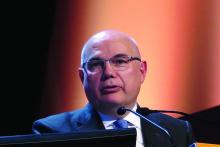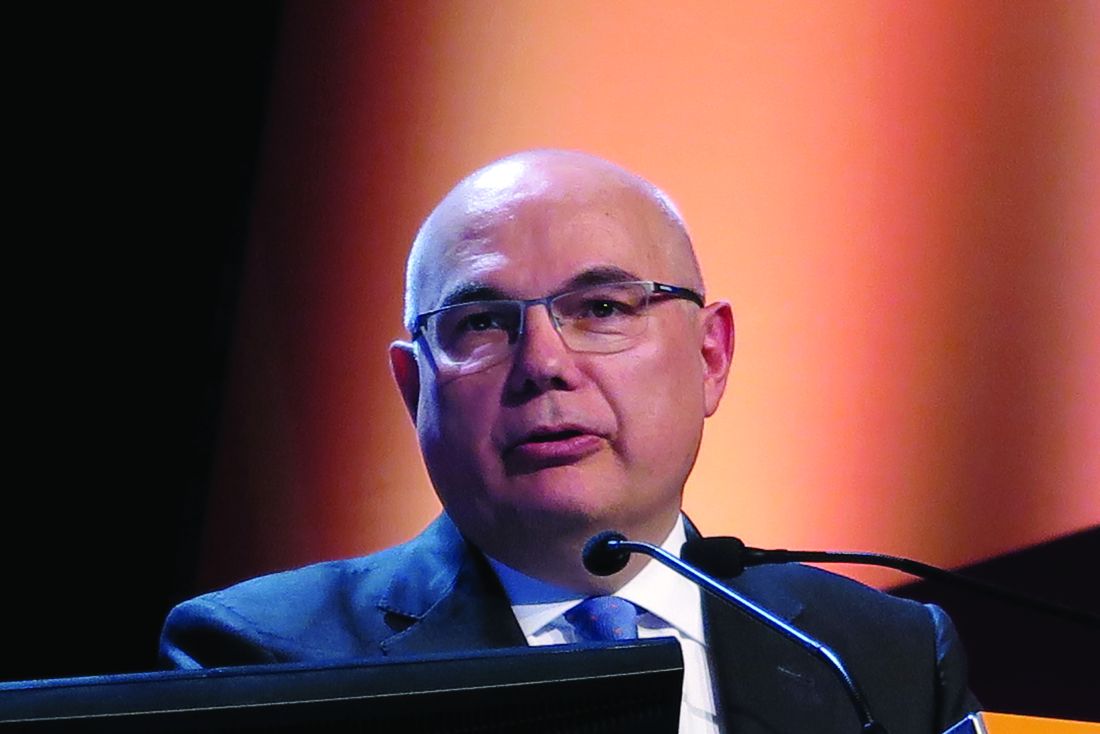User login
BARCELONA – In patients with heavily pretreated metastatic gastric cancer, trifluridine/tipiracil was associated with a brief but statistically significant survival benefit, compared with placebo.
In the randomized, controlled TAGS (TAS-102 Gastric Study), median overall survival, the primary endpoint, was 5.7 months for patients assigned to receive trifluridine/tipiracil, compared with 3.6 months for patients randomized to placebo, reported Josep Tabernero, MD, PhD, of Vall d’Hebron Institute of Oncology in Barcelona.
Trifluridine/tipiracil (Lonsurf) is a combination of an oral thymidine analog (trifluridine, or FTD) and a thymidine phosphorylase inhibitor (tipiracil, or TPI).
It was approved by the Food and Drug Administration in 2015 for the treatment of patients with metastatic colorectal cancer who have been previously treated with chemotherapy and biological therapy.
In a phase 2 study conducted in Japan with 29 patients with metastatic gastric cancer that had progressed after chemotherapy with fluoropyrimidine, platinum, taxanes, or irinotecan, FTD/TPI was associated with a median overall survival of 8.7 months and an investigator-assessed disease control rate of 65.5%, Dr. Tabernero noted.
In the TAGS trial, patients with metastatic gastric cancer, including cancers of the gastroesophageal junction who had disease progression after two or more prior lines of therapy were randomized on a 2:1 basis to receive either oral FTD/TPI 35 mg/m2 twice daily on days 1-5 and 8-12 of each 28-day cycle or to receive placebo. In both arms, patients also received best supportive care.
As noted, the trial met its primary endpoint, with a 2.1 month improvement in median survival over placebo, which translated into a hazard ratio for death with FTD/TPI of 0.69 (P = .0003).
The 12-month overall survival rate for the FTD/TPI group was 21%, compared with 13% for the placebo group.
Median progression-free survival, a secondary endpoint, was also slightly but significantly better with FTD/TPI at 2.0 vs. 1.8 months (HR, 0.57; P less than .0001). Six-month progression-free survival rates were 15% and 6%, respectively.
Grade 3 or greater adverse events occurred in 80% of patients on FTD/TPI versus 58% of those on placebo. The drug combination was associated with more treatment-related adverse events (81% vs. 57%) but fewer adverse events leading to discontinuation (13% vs. 17%) and fewer treatment-related deaths (0.3 % vs. 0.6%).
FTD/TPI was also associated with more cases of grade 3 or 4 neutropenia, leukopenia, lymphocytopenia, anemia, and thrombocytopenia. Six patients (2%) treated with FTD/TPI had grade 3 or 4 febrile neutropenia, compared with none in the placebo group.
“The safety profile of trifluridine/tipiracil was predictable, manageable, and comparable to the population previously evaluated with metastatic colorectal cancer, with no new safety signals,” Dr. Tabernero said.
SOURCE: Tabernero J et al. ESMO GI 2018, Abstract LBA 002.
BARCELONA – In patients with heavily pretreated metastatic gastric cancer, trifluridine/tipiracil was associated with a brief but statistically significant survival benefit, compared with placebo.
In the randomized, controlled TAGS (TAS-102 Gastric Study), median overall survival, the primary endpoint, was 5.7 months for patients assigned to receive trifluridine/tipiracil, compared with 3.6 months for patients randomized to placebo, reported Josep Tabernero, MD, PhD, of Vall d’Hebron Institute of Oncology in Barcelona.
Trifluridine/tipiracil (Lonsurf) is a combination of an oral thymidine analog (trifluridine, or FTD) and a thymidine phosphorylase inhibitor (tipiracil, or TPI).
It was approved by the Food and Drug Administration in 2015 for the treatment of patients with metastatic colorectal cancer who have been previously treated with chemotherapy and biological therapy.
In a phase 2 study conducted in Japan with 29 patients with metastatic gastric cancer that had progressed after chemotherapy with fluoropyrimidine, platinum, taxanes, or irinotecan, FTD/TPI was associated with a median overall survival of 8.7 months and an investigator-assessed disease control rate of 65.5%, Dr. Tabernero noted.
In the TAGS trial, patients with metastatic gastric cancer, including cancers of the gastroesophageal junction who had disease progression after two or more prior lines of therapy were randomized on a 2:1 basis to receive either oral FTD/TPI 35 mg/m2 twice daily on days 1-5 and 8-12 of each 28-day cycle or to receive placebo. In both arms, patients also received best supportive care.
As noted, the trial met its primary endpoint, with a 2.1 month improvement in median survival over placebo, which translated into a hazard ratio for death with FTD/TPI of 0.69 (P = .0003).
The 12-month overall survival rate for the FTD/TPI group was 21%, compared with 13% for the placebo group.
Median progression-free survival, a secondary endpoint, was also slightly but significantly better with FTD/TPI at 2.0 vs. 1.8 months (HR, 0.57; P less than .0001). Six-month progression-free survival rates were 15% and 6%, respectively.
Grade 3 or greater adverse events occurred in 80% of patients on FTD/TPI versus 58% of those on placebo. The drug combination was associated with more treatment-related adverse events (81% vs. 57%) but fewer adverse events leading to discontinuation (13% vs. 17%) and fewer treatment-related deaths (0.3 % vs. 0.6%).
FTD/TPI was also associated with more cases of grade 3 or 4 neutropenia, leukopenia, lymphocytopenia, anemia, and thrombocytopenia. Six patients (2%) treated with FTD/TPI had grade 3 or 4 febrile neutropenia, compared with none in the placebo group.
“The safety profile of trifluridine/tipiracil was predictable, manageable, and comparable to the population previously evaluated with metastatic colorectal cancer, with no new safety signals,” Dr. Tabernero said.
SOURCE: Tabernero J et al. ESMO GI 2018, Abstract LBA 002.
BARCELONA – In patients with heavily pretreated metastatic gastric cancer, trifluridine/tipiracil was associated with a brief but statistically significant survival benefit, compared with placebo.
In the randomized, controlled TAGS (TAS-102 Gastric Study), median overall survival, the primary endpoint, was 5.7 months for patients assigned to receive trifluridine/tipiracil, compared with 3.6 months for patients randomized to placebo, reported Josep Tabernero, MD, PhD, of Vall d’Hebron Institute of Oncology in Barcelona.
Trifluridine/tipiracil (Lonsurf) is a combination of an oral thymidine analog (trifluridine, or FTD) and a thymidine phosphorylase inhibitor (tipiracil, or TPI).
It was approved by the Food and Drug Administration in 2015 for the treatment of patients with metastatic colorectal cancer who have been previously treated with chemotherapy and biological therapy.
In a phase 2 study conducted in Japan with 29 patients with metastatic gastric cancer that had progressed after chemotherapy with fluoropyrimidine, platinum, taxanes, or irinotecan, FTD/TPI was associated with a median overall survival of 8.7 months and an investigator-assessed disease control rate of 65.5%, Dr. Tabernero noted.
In the TAGS trial, patients with metastatic gastric cancer, including cancers of the gastroesophageal junction who had disease progression after two or more prior lines of therapy were randomized on a 2:1 basis to receive either oral FTD/TPI 35 mg/m2 twice daily on days 1-5 and 8-12 of each 28-day cycle or to receive placebo. In both arms, patients also received best supportive care.
As noted, the trial met its primary endpoint, with a 2.1 month improvement in median survival over placebo, which translated into a hazard ratio for death with FTD/TPI of 0.69 (P = .0003).
The 12-month overall survival rate for the FTD/TPI group was 21%, compared with 13% for the placebo group.
Median progression-free survival, a secondary endpoint, was also slightly but significantly better with FTD/TPI at 2.0 vs. 1.8 months (HR, 0.57; P less than .0001). Six-month progression-free survival rates were 15% and 6%, respectively.
Grade 3 or greater adverse events occurred in 80% of patients on FTD/TPI versus 58% of those on placebo. The drug combination was associated with more treatment-related adverse events (81% vs. 57%) but fewer adverse events leading to discontinuation (13% vs. 17%) and fewer treatment-related deaths (0.3 % vs. 0.6%).
FTD/TPI was also associated with more cases of grade 3 or 4 neutropenia, leukopenia, lymphocytopenia, anemia, and thrombocytopenia. Six patients (2%) treated with FTD/TPI had grade 3 or 4 febrile neutropenia, compared with none in the placebo group.
“The safety profile of trifluridine/tipiracil was predictable, manageable, and comparable to the population previously evaluated with metastatic colorectal cancer, with no new safety signals,” Dr. Tabernero said.
SOURCE: Tabernero J et al. ESMO GI 2018, Abstract LBA 002.
REPORTING FROM ESMO GI 2018
Key clinical point: Trifluridine/tipiracil (FTD/TIP) produced a small but significant survival benefit in patients with advanced gastric cancer.
Major finding: Median overall survival was 5.7 months with trifluridine/tipiracil versus 3.6 months with placebo.
Study details: Randomized, placebo-controlled trial in 506 patients with metastatic gastric cancer that progressed on at least two prior lines of therapy.
Disclosures: The study was sponsored by Taiho Oncology. Dr. Tabernero disclosed a consulting or advisory role for the company and others.
Source: Tabernero J et al. ESMO GI 2018, Abstract LBA 002.

